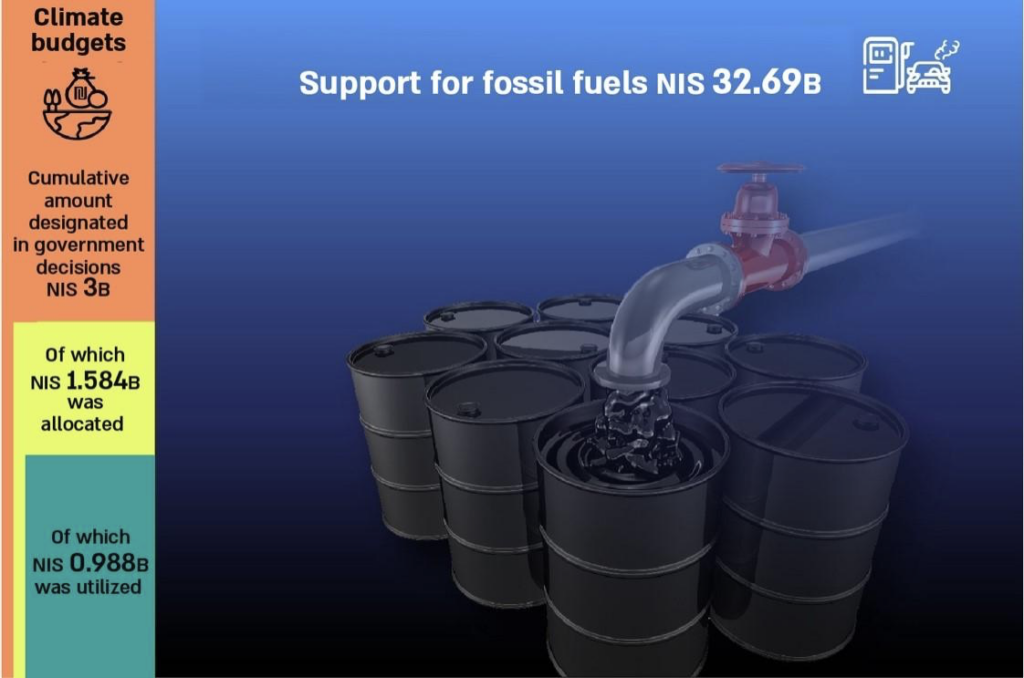National Climate Change Action by the Government of Israel – State Audit Reports

By Dr. Revital Goldshmid and Lior Forkosh (LLM), The State Comptroller and Ombudsman of Israel (19.8.24)
The global climate crisis poses significant threats including water scarcity, extreme weather events, and impacts on agriculture, food security and human health. Israel’s geographical location magnifies these risks as being a ‘Hot Spot’. Various governmental bodies, such as the Ministries of Finance, Environmental Protection, Energy, Transportation, Economy, Agriculture, Defense, the Israel Defense Forces (IDF), and the Planning Administration within the Ministry of Interior, have different responsibilities for addressing climate change.
The State Comptroller’s Office generated two audits within a short timeframe to assess Israel’s preparedness for climate change. The findings were published in a special report in October 2021 (previous audit report), and followed up with another report in March 2024 (follow-up audit report). The objective of the follow-up audit was to evaluate the government’s progress in addressing the deficiencies identified in the initial report, and to what extent the previous audit report’s recommendations have been implemented. Additionally, the audit explored new aspects that were not covered in the previous report.
These audit reports are unique in several aspects. Firstly, they address a developing issue within the government work, providing decision-makers with a comprehensive, future-oriented document. Secondly, they include varied data of analyses conducted by experts on financial, physical, and geopolitical risks, highlighting the necessity of integrating these into a national risk strategy. Thirdly, the reports examine the issue at multiple levels: inter-ministerial, sectorial (public, private, and civil society), economic (energy and transportation), as well as from an international perspective. This integrated approach provides comprehensive assessment. Fourthly, they analyses organizational and functional gaps within and between government bodies, suggesting improvement in managing climate issues.
Recognizing the need for initial government measures based on existing knowledge to minimize risks to human health, the environment and infrastructure and to reduce vulnerability, the reports examined government resolutions and actions over the past 15 years, in several areas: mitigation of greenhouse gas (GHG) emissions; renewable energy targets; multi-sectorial climate change adaptation; macroeconomic and financial risks and the government policies in greening the economic system and structural and governance gaps.
Those reports also include an international layer, which contains comparative reviews of actions taken in other countries, presentation of content from international professional organizations on the report topics, analysis of global trends, actions and recommendations of countries and international organizations, Organisation for Economic Co-operation and Development (OECD) risk analysis methodology, and scientific reports. Throughout the audit process, the auditors consulted with experts, researchers, key management and professional staff actors across dozens of public entities, government ministries and their subordinate bodies, industry representatives and other stakeholders.
Audit as a Progression Process
Dialogues and discussions during the audits have encouraged progress among audited bodies, sometimes even before the final report is published. For instance, the communication between the audit managers and the heads of defense ministries and the National Security Council of Israel, during the audit process led to integrating climate change risks into the national emergency scenarios.
Furthermore, during the final stages of drafting the audit report, after distributing the draft to relevant ministries and bodies, the Ministry of Environmental Protection promoted an updated climate law proposal. The bill draft was approved by the cabinet’s legislation committee in September 2023. During Environment Day in early July 2024, discussions at the legislation committee, focused on implementation of the audit report’s findings. Various government representatives reported their progress in promoting actions to address climate change issues. The Ministry of Environmental Protection provided updates on the legislative progress of the Climate Law and the preparation of the National Climate Adaptation Plan. This plan includes mapping areas in Israel affected by climate change and outlining key measures to address their impacts, including 48 initiatives and approximately 200 tasks for around 30 government ministries and agencies.
This example demonstrates how audit reports can potentially influence in encouraging governmental progress without directly intervening in the legislative process.
Audit as an Analytical Tool
The audit reports and data analysis serve as information tools and frameworks for actions by audited bodies, providing knowledge resources previously unavailable to the public. Data compiled through a questionnaire distributed to all government ministries and relevant public bodies, provided comprehensive information including quantitative and comparative data analysis. For instance, the audit reports presented new quantitative data comparing climate policy budgets and governmental support for fossil fuels against allocations and utilization budgets for climate-related initiatives. This information is now public and can be used by public bodies when considering various policy alternatives.
Additionally, a survey conducted among 60 government ministries and public bodies quantitatively mapped areas of weakness and gaps in governmental action related to climate risks. The survey identifying trends such as a slight improvement (2%) in ministry-level climate risk adaptation plans and an increase (3%) in the number of public bodies performing organizational risk assessments related to climate change scenarios.
Main Gaps Identified During the Audit Process and Were Part of the Findings
In 2020, Israel recorded lowest reduction in emissions among developed countries. Several gaps were identified in the government’s process of approving its national climate change adaptation plan, with insufficient progress by many public bodies. The audit reports found a need for a comprehensive national economic and fiscal assessment related to climate change and the formulation of long or medium term climate policy. Part of the difficulty in achieving progress is the absence of an integrative governmental entity for climate issues.
These findings have led the government forfeited state revenues exceeding NIS 32 billion through supports and subsidies for fossil fuels, 10.6 times the amount planned for climate investment (the decision to allocate about 3 billion NIS), and 33 times the amount actually invested (budget utilization of 988 million NIS). These gaps are shown in the chart below, reflect the government’s priorities with multiple declarations of climate goals without the necessary resource allocation, alongside continued funding policies that undermine these goals.
Climate Budgets Determined in Government Decisions, Their Allocation and Utilization, Compared with Subsidies for Fossil Fuels, 2015 – 2022 (in NIS B)

Conclusions
Despite numerous statements and decisions, the government has not addressed many of the deficiencies identified in the 2021 climate change preparedness report. The follow-up report highlights key failures such as: absence of a leading governmental coordinating entity, delays in binding regulations, and insufficient government attention to climate risks and macroeconomic impacts. While there has been some progress in setting emission reduction targets and preparing the security and banking sectors, most government ministries have yet not taken adequate actions to mitigate these risks.
Recommendations
Based on Israel’s experience conducting two climate audit reports within three years, there is an urgent need for decisive governmental action on climate change. Key recommendations include: establishing a dedicated governmental entity to coordinate climate efforts; advancing binding legislation with clear targets; implementing a carbon tax to internalize environmental costs; investing in infrastructure for energy diversification; developing a comprehensive national risk management strategy; promoting and budgeting an adaptation plan addressing climate change risks; and reforming budgeting practices to adequately fund climate initiatives. These actions are critical for aligning Israel’s policies with international commitments to mitigate greenhouse gas emissions and ensure sustainable development in the face of global environmental challenges.
Key Impacts Following the Climate Audit Reports
Key impacts of the reports conducted by the State Comptroller’s Office includes the following:
- The Innovation Authority quintupled its investments in climate technologies, hired experts to evaluate projects, and created policy tools to classify technological projects as climate ventures.
- The carbon tax, under discussion in Israel for 15 years, is advancing for approval in the parliament, following its importance highlighted in two reports.
- The recently passed first reading of the Climate Law mandated government ministries to prepare climate risk preparedness plans with binding timelines, as recommended by the report.
The Role of SAI in Promoting Climate Change Issues
The article highlights the critical role of State Audit Institutions (SAIs) in advancing climate change issues within governmental work, emphasizing their potential to raise awareness among stakeholders and the public.
To effectively fulfill their responsibilities, SAIs should generate follow-up reports aimed at driving substantial change. The Israeli State Comptroller’s follow-up audit report has significantly promote awareness of climate change issues. Therefore, SAIs should incorporate such initiatives into their strategic plans and foster international collaborations for current and future generations well-being.





